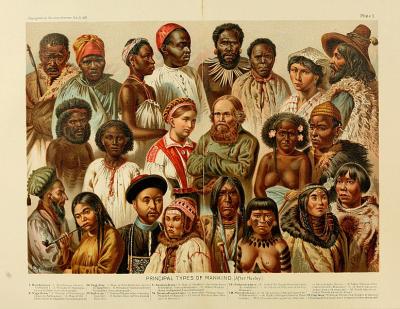Insights from the Collections
The Consortium's collections provide many opportunities to learn more about the history of science, race, and racism.
Our cross-institutional search tool allows researchers to investigate materials across multiple institutions from a single interface. With millions of catalog records of rare books and manuscripts and thousands of finding aids, the Consortium's search hub offers scholars and the public the ability to identify and locate relevant materials.
Some archival materials related to this topic include:
Rudolf Virchow Medical Society Records, New York Academy of Medicine
L.C. Dunn Papers, American Philosophical Society
Ashley Montagu Papers, American Philosophical Society
Samuel George Morton Papers, American Philosophical Society
Raymond Pearl Papers, American Philosophical Society
Theodosius Dobzhansky Papers, American Philosophical Society
Franz Boas Papers, American Philosophical Society
Ernst Mayr Papers, American Philosophical Society
Victor George Heiser Papers, American Philosophical Society
Samuel George Morton Papers, Library Company of Philadelphia
Carleton Stevens Coon Papers, Smithsonian Institution
Ernest Hooton Papers, Harvard University
Other Web resources:
The Disturbing Resilience of Scientific Racism, by Ramin Skibba; Smithsonian Magazine
Racism in Science: The Taint that Lingers, by Robin Nelson; Nature
How to Fight Racism Using Science, by Adam Rutherford; The Guardian
Learn more about our speakers:
Richard Wetzell
Andy Evans
Warwick Anderson
Christa Kuljian
Elise Burton
Sadiah Qureshi
Sebastián Gil-Riaño
Rana Hogarth
John Jackson
Related publications from our speakers:
Eugenics, Racial Science, and Nazi Biopolitics: Was There a Genesis of the 'Final Solution' from the Spirit of Science?, by Richard F. Wetzell, in Beyond the Racial State: Rethinking Nazi Germany, edited by Devin O. Pendas, Mark Roseman, and Richard F. Wetzell; Cambridge University Press, 2017.
Anthropology at War: World War I and the Science of Race in Germany, by Andrew D. Evans; University of Chicago Press, 2010.
From Racial Types to Aboriginal Clines: The Illustrative Career of Joseph B. Birdsell, by Warwick Anderson; Historical Studies in the Natural Sciences 50(5), 2020.
Colonial Pathologies: American Tropical Medicine, Race, and Hygiene in the Philippines, by Warwick Anderson; Duke University Press, 2006.
The Cultivation of Whiteness: Science, Health, and Racial Destiny in Australia, by Warwick Anderson; Melbourne University Press, 2002.
Darwin's Hunch: Science, Race, and the Search for Human Origins, by Christa Kuljian; Jacana Media, 2016.
Genetic Crossroads: The Middle East and the Science of Human Heredity, by Elise K. Burton; Stanford University Press, 2021.
Peoples on Parade: Exhibitions, Empire, and Anthropology in Nineteenth-Century Britain, by Sadiah Qureshi; University of Chicago Press, 2011.
Relocating Anti-Racist Science: The 1950 UNESCO Statement on Race and Economic Development in the Global South, by Sebastián Gil-Riaño; British Journal for the History of Science 51(2), 2018.
Medicalizing Blackness: Making Racial Difference in the Atlantic World, 1780-1840, by Rana A. Hogarth; UNC Press, 2017.
Darwinism, Democracy, and Race: American Anthropology and Evolutionary Biology in the Twentieth Century, by John P. Jackson, Jr., and David J. Depew; Routledge, 2017.
Science for Segregation: Race, Law, and the Case Against Brown v. Board of Education, by John P. Jackson, Jr.; NYU Press, 2005.
Social Scientists for Social Justice: Making the Case Against Segregation, by John P. Jackson, Jr.; NYU Press, 2001.
See also recent work from our fellows:
Nazi Entanglement: Pascual Jordan, Quantum Mechanics, and the Legacy of the Third Reich, Ryan Dahn
Human Remainders: The Lost Century of the Samuel George Morton Collection, Paul Mitchell
Between Cope and Osborn: The Role of American Biological Discourse on the Public Debate on Evolution, David Ceccarelli
Colored Insane: Slavery, Asylums, and Mental Illness in the 19th Century, Diana Louis
Abolition and the Making of Scientific Racism in the Anglo-Atlantic, Sean M. Smith
By Their Locks You Shall Know Them: Race, Science, and Hair in the Nineteenth Century, Timothy Minella
The Peculiar Institution and the Making of Modern Psychiatry, 1840-1880, by Wendy Gonaver; UNC, 2019.
Monstrous Childbirth: Concepts of Race and Defective Reproduction in Nineteenth-Century U.S. Science, Medicine, and Law, Miriam Rich
Treating the Black Body: Race and Medicine in American Culture, 1800-1861, Christopher Willoughby
Related forums and podcasts:
Black Maternal Health: Historical and Reproductive Justice Reckonings
Immortal Life: The Promises and Perils of Biobanking and the Genetic Archive
Materials of the Mind, an interview with James Poskett
The Lost White Tribe, an interview with Michael Robinson
Bone Rooms, an interview with Sam Redman










